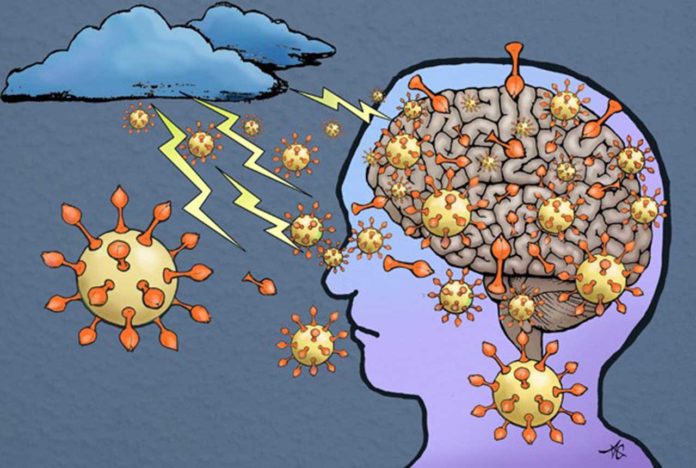According to a new study from the University of Washington, SARS-CoV-2, the cause of COVID-19, can enter the brain.
The study suggests that people with COVID-19 are suffering from cognitive effects. The spike protein, often depicted as the virus’s red arms dictates which cells the virus can enter.
Lead author William A. Banks, a professor of medicine at the University of Washington School of Medicine and a Puget Sound Veterans Affairs Healthcare System physician and researcher, said, “Usually, the virus does the same thing as its binding protein. Banks said binding proteins like S1 usually by themselves cause damage as they detach from the virus and cause inflammation.”
“The spike protein, often called the S1 protein, likely causes the brain to release cytokines and inflammatory products.”
The intense inflammation caused by the COVID-19 infection is called a cytokine storm. Upon seeing the virus and its proteins, the immune system overreacts in its attempt to kill the invading virus. The infected person is left with brain fog, fatigue, and other cognitive issues.
The S1 protein in SARS-CoV2 and the gp 120 protein in HIV-1 function similarly. They are glycoproteins—proteins that have many sugars on them, hallmarks of proteins that bind to other receptors. Both these proteins function as the arms and hands for their viruses by grabbing onto other receptors. Both cross the blood-brain barrier, and S1, like gp120, is likely toxic to brain tissues.
Banks said, “We know that when you have the COVID infection, you have trouble breathing and that’s because there’s an infection in your lung, but an additional explanation is that the virus enters the respiratory centers of the brain and causes problems there as well.”
Jacob Raber, a professor in the departments of Behavioral Neuroscience, Neurology, and Radiation Medicine, and his teams at Oregon Health & Science University said, “In their experiments transport of S1 was faster in the olfactory bulb and kidney of males than females. This observation might relate to the increased susceptibility of men to more severe COVID-19 outcomes.”
Banks said, “You do not want to mess with this virus. Many of the effects that the COVID virus has could be accentuated or perpetuated or even caused by a virus getting in the brain, and those effects could last for a very long time.”
Journal Reference:
- Elizabeth M. Rhea et al., The S1 protein of SARS-CoV-2 crosses the blood-brain barrier in mice, Nature Neuroscience (2020). DOI: 10.1038/s41593-020-00771-8
